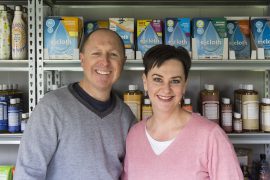Mould and Damp Areas
Mould spores can provoke immune reactions. Check for musty smells in bathrooms and behind furniture. A dehumidifier can help keep the air dry, especially in tropical climates. Regularly cleaning tiles, shower curtains and hidden corners can also prevent mould from taking hold.
Smelly Water Heater
Water heaters can develop sulphur smells due to bacterial growth, which may irritate sensitive immune systems. To clear this out, flush the tank and add 3% hydrogen peroxide using this safe ratio – 16 to 32 fluid ounces or about 475 to 950 ml of hydrogen peroxide for every 40 gallons of tank capacity. Pour into the outlet or pressure valve, refill the tank and enjoy cleaner, better-smelling water.
Dust and Pet Dander
Use a high-efficiency particulate air (HEPA) filter vacuum and regularly wash soft toys and bedding to reduce allergens that could stress the immune system. This can help limit dust mites, pet dander and other particles that may trigger inflammation in sensitive children.
Packaging Waste in Water
Food packaging makes up 49% of U.S. litter, much of which pollutes waterways. This can introduce microplastics and toxins into your home’s water, which may affect immune health. Use filtered water and choose glass or low-packaging food options when possible.
How to Build a Healthier Environment for Your Child
While you can’t bubble-wrap your child, these small steps can make a big difference in building up their natural defences:
- Breastfeeding when possible: Breastmilk transfers beneficial antibodies and supports gut health. The World Health Organisation (WHO) recommends exclusive breastfeeding for the first six months.
- Keep vaccinations updated: Vaccines don’t cause autoimmune diseases. In fact, they protect your child from infections that might trigger autoimmune responses in genetically predisposed kids.
- Offer whole foods early: Diverse, fibre-rich foods feed good gut bacteria. Once your baby starts solids, include vegetables and fermented foods like yoghurt and limit ultra-processed snacks.
- Let them get a bit messy: Allow supervised outdoor play in nature. Playing in soil and interacting safely with animals supports immune training.
- Talk to your paediatrician about family history: If autoimmune diseases are common in your family, flag it with your child’s doctor. They can keep an extra eye on early signs and possibly refer you to a specialist sooner.
Creating a Safer Start for Your Little One
Autoimmune diseases in children are becoming more common, but knowledge and preventive action can help. By understanding the triggers, spotting early signs and making simple changes in your home environment, you’re giving your child the best chance at long-term health.
Jane Marsh is the founder and editor-in-chief of Environment.co where she shares practical tips on how to live a greener life.










